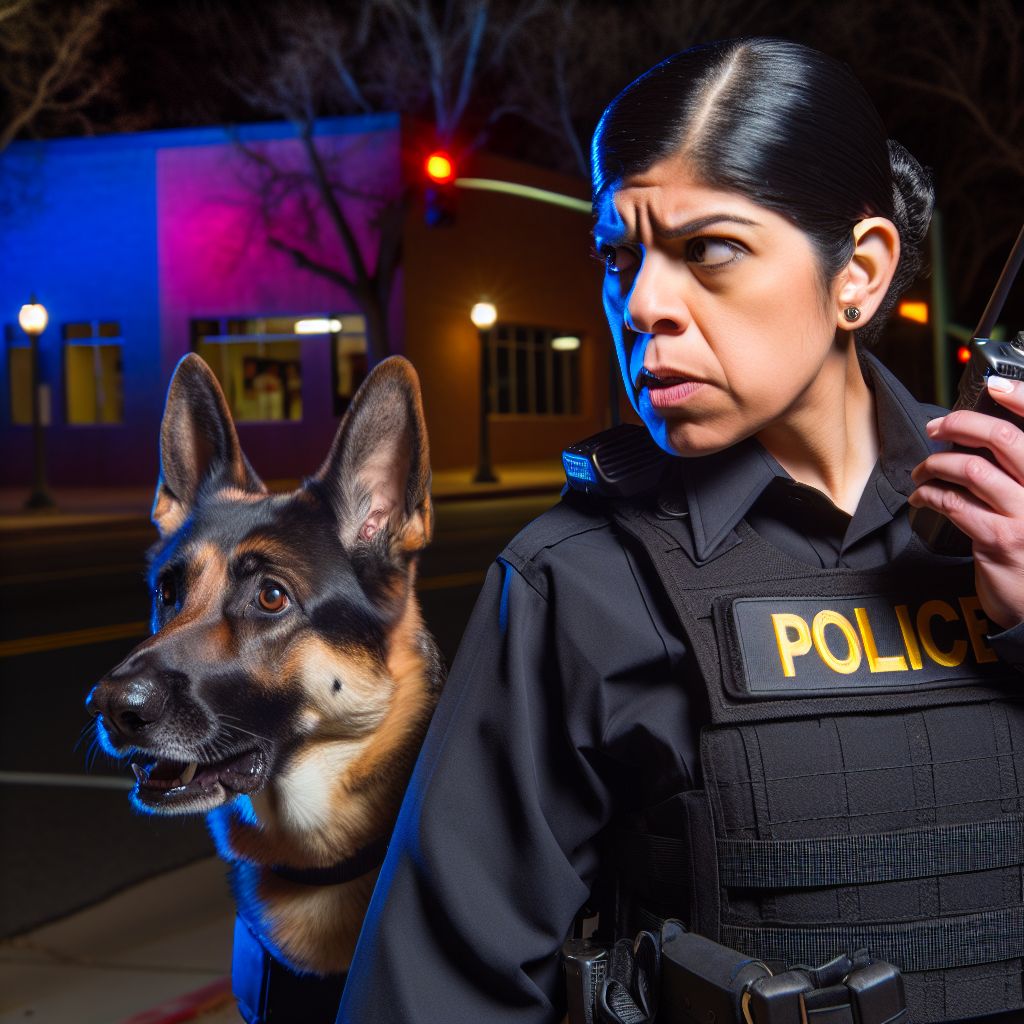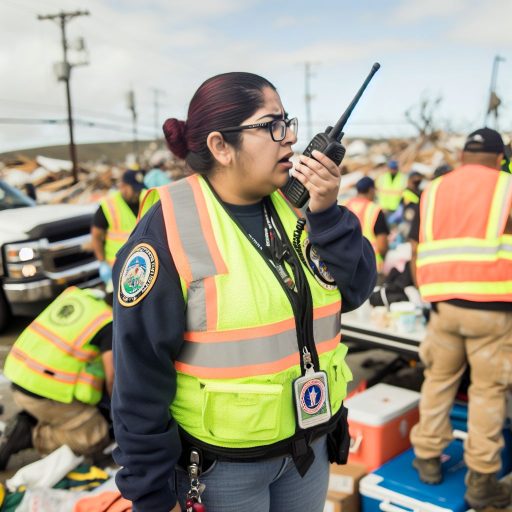K-9 Officers in Law Enforcement
K-9 officers are essential members of law enforcement teams.
They are trained to assist in various tasks.
Their roles include drug detection, search and rescue operations, and apprehension of suspects.
Challenges Faced by K-9 Officers
K-9 officers face numerous challenges in their line of duty.
Physical demands require K-9 officers to stay fit.
They must keep up with the rigorous demands of their work.
Constant training is necessary to maintain their skills.
K-9 officers require regular and consistent training sessions.
The nature of their work exposes them to various health risks.
Health concerns are a reality for K-9 officers.
Emotional stress comes from facing difficult situations.
K-9 officers often encounter emotionally charged situations in the line of duty.
There is also a risk of injury during operations.
K-9 officers put their safety on the line daily.
High expectations are placed on K-9 officers.
They are expected to perform flawlessly in high-pressure situations.
Legal considerations play a significant role in their work.
K-9 officers must adhere to strict legal guidelines while carrying out their duties.
Public perception can impact their morale.
K-9 officers often face scrutiny from the public.
Transform Your Career Today
Unlock a personalized career strategy that drives real results. Get tailored advice and a roadmap designed just for you.
Start NowWork-life balance presents challenges for these officers.
Balancing work demands and personal life can be tough for K-9 officers.
Team dynamics are vital for successful outcomes.
K-9 officers must work effectively with their human handlers.
It is important to recognize and support K-9 officers.
They work tirelessly to keep our communities safe.
Physical Challenges:
Description of the physical demands of being a K-9 officer.
Discussion of the strenuous training required for both the officer and the dog.
Explanations of the risks of injuries during apprehensions and searches.
Being a K-9 officer comes with its own set of physical challenges that require both mental and physical strength.
One of the primary physical demands of a K-9 officer is the need to maintain peak physical fitness.
This is crucial in order to keep up with the rigorous demands of the job and to act as a good role model for the K-9 partner.
The training required for both the officer and the dog is extremely strenuous and demanding.
Handlers must undergo intensive physical conditioning to keep up with their canine partners.
The dogs themselves also require extensive training to develop the necessary skills for the job.
During apprehensions and searches, there are inherent risks of injuries for both the officer and the K-9 partner.
These situations can be physically demanding and dangerous, requiring officers to be in top physical condition.
This is essential to handle any unexpected challenges that may arise.
Psychological Challenges:
When it comes to the psychological challenges faced by K-9 officers in their line of duty, the emotional toll cannot be underestimated.
K-9 officers develop a strong bond with their canine partners, often considering them as family.
Transform Your Career Today
Unlock a personalized career strategy that drives real results. Get tailored advice and a roadmap designed just for you.
Start NowImagine the devastation and heartbreak a K-9 officer experiences when their loyal companion is injured or killed in the line of duty.
This loss can be overwhelming, leading to feelings of sadness, grief, and even guilt for not being able to protect their partner.
Moreover, the nature of the situations K-9 officers deal with can be extremely stressful and traumatic.
From apprehending dangerous criminals to searching for missing persons in hazardous conditions, K-9 officers are constantly exposed to high-risk situations that can take a toll on their mental well-being.
The stress of the job, coupled with the emotional attachment to their dogs, can push K-9 officers to their limits.
They may struggle with anxiety, depression, and post-traumatic stress disorder (PTSD) as a result of their experiences in the field.
It is crucial to recognize the psychological impact of the work that K-9 officers do and to provide them with the necessary support.
Mental health resources, such as counseling services and peer support groups, should be readily available to help K-9 officers cope with the challenges they face on a daily basis.
By prioritizing the mental well-being of K-9 officers, we can ensure that they are better equipped to handle the demands of their job.
This will allow them to continue to serve and protect their communities effectively.
After all, a healthy mind is just as important as a strong and capable body when it comes to serving in law enforcement.
Discover More: Private Investigators: Skills Beyond Surveillance
Legal Challenges:
Understanding the legal framework surrounding the deployment of K-9 units in law enforcement is crucial.
K-9 officers must ensure they adhere to all relevant laws and regulations when utilizing their canine partners.
The use of force by K-9 officers is closely scrutinized, and they must be prepared to justify their actions.
Potential Liability Issues:
K-9 officers may face legal consequences if their dogs unintentionally harm innocent civilians during operations.
It is essential for K-9 units to have proper insurance coverage to protect against potential lawsuits and claims.
Training programs should include modules on liability awareness to educate officers on mitigating risks during their duties.
Training and Certification Requirements:
K-9 officers must undergo rigorous training to ensure they are well-equipped to handle their responsibilities effectively.
Certification processes for K-9 units involve assessments of both the officer and their canine partner’s abilities.
Transform Your Career Today
Unlock a personalized career strategy that drives real results. Get tailored advice and a roadmap designed just for you.
Start NowRegular refresher courses and evaluations are necessary to maintain compliance with evolving laws and regulations.
Discover More: Collaboration Between School Resource Officers and Staff
Public Perception Challenges:
Misconceptions and stereotypes surround K-9 officers and their work.
Difficulties K-9 officers may face in gaining public trust and support.
Need for community outreach and education to improve public perception of K-9 officers.
One of the main challenges that K-9 officers face in their line of duty is the public perception of their work.
There are often misconceptions and stereotypes surrounding these officers and the tasks they perform on a daily basis.
It is crucial to address and overcome these challenges to ensure that K-9 units are appreciated and supported by the communities they serve.
Misconceptions and Stereotypes:
One common misconception is that K-9 officers are aggressive and only trained to attack.
In reality, these officers are highly trained to detect explosives, drugs, and other illegal substances, as well as to search for missing persons.
They play a vital role in law enforcement, working alongside human officers to keep communities safe.
Additionally, there is a stereotype that K-9 officers are mean or dangerous animals.
In truth, these dogs are loyal, obedient, and well-trained.
They are valued members of law enforcement teams and form strong bonds with their handlers, often putting their lives on the line to protect others.
Difficulty in Gaining Public Trust:
Despite their important role in law enforcement, K-9 officers may face challenges in gaining public trust and support.
Some individuals may be wary of police dogs due to fear or lack of understanding of their training and capabilities.
This can lead to reluctance to cooperate with K-9 units during investigations or search operations.
Moreover, there can be misconceptions about the use of K-9 officers in certain communities, leading to distrust and skepticism.
It is essential for K-9 units to engage in open communication with the public, educate them about the valuable work they do, and build positive relationships to foster trust and understanding.
Importance of Community Outreach:
To improve public perception of K-9 officers, community outreach and education are crucial.
Transform Your Career Today
Unlock a personalized career strategy that drives real results. Get tailored advice and a roadmap designed just for you.
Start NowK-9 units should actively engage with local residents, schools, businesses, and organizations to raise awareness about their role and responsibilities.
This can help dispel myths and foster a sense of trust and cooperation between K-9 officers and the community.
By participating in events, demonstrations, and outreach programs, K-9 officers can showcase their skills and demonstrate the positive impact they have on public safety.
Building relationships with community members and addressing their concerns can go a long way in improving public perception and garnering support for K-9 units.
Explore Further: TSA Officer Career Path: Opportunities for Advancement
Training Challenges:
Training is an essential aspect of preparing K-9 officers and their dogs for the challenging tasks they face in the line of duty.
Here are some of the key challenges related to training:
- Ongoing Training and Certification Requirements: K-9 officers are required to undergo continuous training to maintain their skills and stay up to date with the latest techniques. This includes certification exams to ensure that both the officer and the dog are performing at a high level.
- Maintaining High Standards of Proficiency: K-9 officers must excel at various tasks such as detection, tracking, and apprehension. The challenge lies in consistently meeting the high standards expected in these areas, which requires continuous practice and refinement of skills.
- Resources Needed for Training: K-9 units need access to resources such as training facilities, equipment, and qualified trainers. Adequate funding is crucial to ensure that K-9 officers receive the necessary support to stay well-equipped and updated on training techniques.
Training challenges faced by K-9 officers highlight the ongoing commitment required to maintain peak performance in the line of duty.
See Related Content: Emergency Management Director: Developing Leadership Skills

Equipment Challenges:
Specialized equipment is vital for K-9 officers and their dogs to perform their duties effectively.
Professional K-9 teams require specific gear such as harnesses, leashes, and protective vests.
Training aids like scent detection tools, bite sleeves, and agility equipment are essential for their exercises.
The costs associated with training and maintaining this equipment can be substantial for law enforcement agencies.
Regular updating of gear is necessary to keep up with evolving technology and safety standards.
Proper equipment not only ensures the safety of K-9 units but also enhances their overall effectiveness in the field.
- Professional K-9 teams require specific gear such as harnesses, leashes, and protective vests.
- Training aids like scent detection tools, bite sleeves, and agility equipment are essential for their exercises.
- The costs associated with training and maintaining this equipment can be substantial for law enforcement agencies.
- Regular updating of gear is necessary to keep up with evolving technology and safety standards.
- Proper equipment not only ensures the safety of K-9 units but also enhances their overall effectiveness in the field.
Communication Challenges:
Communication is key in any line of work.
It is especially crucial for K-9 officers who rely heavily on their communication with their canine partners.
In high-stress situations, such as chasing down a suspect or conducting a search, effective communication can mean the difference between success and failure.
K-9 officers often face challenges in communicating with their dogs during intense situations.
Dogs may become overwhelmed or distracted, making it difficult for them to follow commands.
Transform Your Career Today
Unlock a personalized career strategy that drives real results. Get tailored advice and a roadmap designed just for you.
Start NowThis can hinder the officers’ ability to control their canine partners and jeopardize the safety of everyone involved.
Moreover, clear and effective communication between K-9 officers and other law enforcement personnel is essential for coordinating efforts.
This ensures the success of operations. Miscommunication or lack of communication can lead to confusion, delays, and potentially dangerous situations.
To address these challenges, K-9 units implement training methods to improve communication skills among officers and their canine companions.
This training emphasizes the importance of establishing a strong bond between the officer and the dog.
It also focuses on practicing clear and consistent commands.
By enhancing communication within K-9 units, officers can overcome challenges.
This allows them to work more effectively with their canine partners.
Such improvements not only enhance the overall performance of the unit but also improve the safety and success of their missions.
Communication challenges are prevalent in the line of duty for K-9 officers.
With proper training and dedication, these obstacles can be overcome.
Clear and effective communication is paramount for the success of K-9 units and the safety of all involved.
Challenges Faced by K-9 Officers in the Line of Duty
K-9 officers encounter various challenges during their daily duties.
One major challenge is handling dangerous suspects in high-stress situations.
Another challenge is navigating through rough terrains during search and rescue operations.
K-9 officers also face the risk of physical harm or injury while apprehending suspects.
Training and maintaining the health of police dogs are crucial challenges too.
Dealing with intense emotions and stress from traumatic incidents is also a challenge.
K-9 officers must constantly stay alert and focused during their tasks.
The pressure to perform efficiently and effectively adds to their challenges.
Transform Your Career Today
Unlock a personalized career strategy that drives real results. Get tailored advice and a roadmap designed just for you.
Start NowBuilding a strong bond and communication with their K-9 partners is vital.
Adapting to unpredictable and rapidly changing situations is a constant challenge for K-9 officers.
Support for K-9 Officers
In summary, K-9 officers face numerous challenges while serving in law enforcement.
It is essential to recognize and support the hard work and dedication of K-9 officers.
Let us raise awareness and appreciation for the critical role that K-9 units play in law enforcement.
Additional Resources
Office of Justice Services | Indian Affairs
Chapter 63. – Title 23 – DOMESTIC RELATIONS
[E-Books for Sale]
The Big Book of 500 High-Paying Jobs in America: Unlock Your Earning Potential
$19.99 • 500 High-Paying Jobs • 330 pages
Explore 500 high-paying jobs in America and learn how to boost your career, earn more, and achieve success!
See All 500 High-Paying Jobs of this E-Book
1001 Professions Without a Degree: High-Paying American Jobs You Can Start Now
$19.99 • 1001 Professions Without a Degree • 174 pages
Discover 1001 high-paying jobs without a degree! Unlock career tips, skills, and success strategies for just $19.99!




